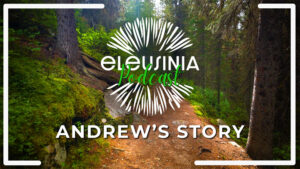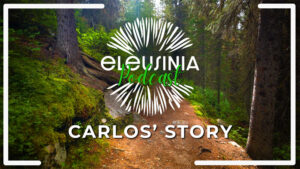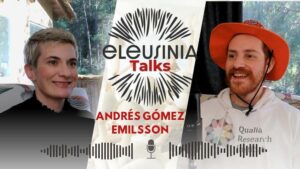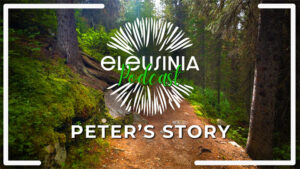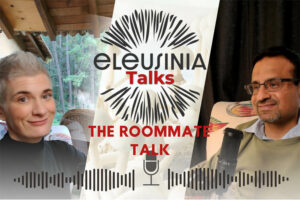Suzy shares her experience at Eleusinia. Expecting to work with her unrelenting grief after loosing her father she had an unexpected surprise of joy, peace, and connection with her spouse while attending a psychedelic retreat as a couple. Suzy tells a beautiful story as she describes finding her own hero in the space between. This episode is an amazing example of how one may come to Eleusinia with preconceived ideas of what to expect, but leave with so much more. Listen here or on Apple Podcasts.
Tawnya: You have made it to the psilocybin podcast with tales from Eleusinia a unique science-based psilocybin retreat based out of Mexico. That not only focuses on brain health and wellbeing, but actually specializes in pain management. I am your host, Tawnya, the medical director come along. As we break down the latest in psychedelic research news and the inner workings of this amazing experience. Suzy, thank you so much for coming to the show. It is so amazing to see your face again. Today I’m here doing this podcast with Andrew.
Andrew: Hello, hello. It’s so good to see you, Suzy.
Tawnya: Yeah. And if you could tell us a little bit about who you are and, and what you’re up to now.
Suzy: Sure. Sure. First of all, thank you so much for having me. It is such an honor to be able to share my experience and it’s really meaningful to me that possibly something I say will resonate with somebody way out there in the huge world. And and that’s really important.
So I am Suzy and oh my gosh, I’m so multifaceted. I would identify myself as a mother, as a wife, as a former business owner. Today I’m actually sliding into retirement, but I also consider myself an artist of a lot of different forms. One of the things that I’ve been told is that, although I am very artistic, I also am a scientist. I love knowledge. I love growth. And I look at that as kind of why I have come so to speak. That’s what I do.
Tawnya: So what were the reasons that you decided to come to Eleusinia?
Suzy: You know, initially I would’ve said that I was there because I felt like I had lost various parts of myself through grief, losing my father. Through connection to my husband, a breach of trust and a breach of what we considered our connection at one time. But reflecting back, today is actually the one month anniversary of being at Eleusinia, which is amazing, I would say that really why I came was to retrieve parts of myself that I had disassociated from. I couldn’t find them anymore. I think that’s really why I was there.
Tawnya: Can you take us back to preparing for the retreat, deciding, and then what it was like to make it here and then arrive?
Suzy: It was rough. It was, it was rough. I’m not sure if my wonderful husband touched upon the turmoil that we felt through the whole situation. But the idea of coming to the retreat was mine. It stemmed from chronic phantom limb pain that my husband lives with on a daily basis. And he very casually, a couple years ago, after many, many years of being together told me that on every single day of his life, he felt like his hand was in a vice grip. I couldn’t shake that.
I could not understand, because I myself am not an amputee, but I couldn’t understand how anybody had learned to accept living with chronic pain. It broke my heart, but it also made me understand a lot about addiction and the need to numb out. And that was something that we had struggled with interpersonally in our relationship. So I went on this mission, this journey, of how do I help the love of my life feel relief?
And that is how I started looking into mirror therapy and I came across originally some study that was about a man who had lost his leg and was able to stop phantom limb pain. And boy, it was a deep dive into all things of what’s out there.
And I was so impressed with everything that Eleusinia has put together, but mostly what I was really impressed with was the approach was more about the science of the brain, the science of the neurological transformation, but also that it left room for spirituality and coming back to your physical body. That was very important to me because of course I was grappling with all of these stories of death and loss and of trying again to retrieve these parts of myself. So it really was a great fit for the two of us.
Getting there was a bumpy ride. It almost didn’t happen. The night before the trip, Warren canceled everything. We were just waring, and I think there might have been some fear behind it – fear of change, growth, movement, the human part of that. So, yeah, but we got there.
Andrew: I love that you were able to find yourself within that journey as well. I’m so curious to hear about how you felt like your heart and your embodiment and everything started opening up for you. What are some of those parts that you feel like you discovered?
Suzy: Yeah. You know, I try to intentionally live my life in a way that I could be personally proud of as a human being, and connection with other people, it’s always felt like my happy place, like that is where I get so much of my dynamic energy. My life force comes from my connections that I get through other people.
But somewhere along the line, and I didn’t realize this was something that was happening to me until my father passed away, as somewhere along the line I had almost gotten to the point where that was all of my life force. That was everything that I experienced and Tawnya you and I had talked a lot about, during my Hero dose, I had this really profound moment where I was myself doing some mirror work. I was a little curious, like what is this about? And I had this moment where I realized that we can spend a lot of time doing whatever it is that we do for a living, or whatever it is that we present to the world and falsely believe that that’s actually who we are, that there’s nothing more to that.
And I think with that filter, we can start to slip away from where our happiness lies. So for me, in my mind, I term it “the space between.” So there’s this little space between, and I found it during my Hero dose, I had a moment where everything else dropped away and there was no longer what is gonna happen tomorrow or the perceived issues of what happened yesterday.
And right in that space, I connected with the space between, and that space between is where my hero was parked. And I was like, “how did I forget you were there?” All this time. So I didn’t, I never lost myself. I misplaced my intention.
Tawnya: I love that so much. And I want to step back to get a bigger feel of who this hero is. You misplaced that hero of yourself, your own hero. When was the last time she was there?
Suzy: You know, I think we find ourselves in different ways at different times and they’re all very authentic. So I can’t really say. I think it’s all part of that psychedelic shift, right? That’s where that’s where the unexplainable comes in. It’s not about being a child, and it’s not about being a grownup and it’s not about all the different things that you learn through psychoanalysis and everyday life.
It’s joy. You know, it’s this place that is very simple.
For example, one of the things I thought I was there to do was mourn my father, which I’m telling you, when I say I cried daily, we’re talking like, oh my God. I have an amazing therapist that has been so profound and helpful, and yet I still could not stop crying. And when I connected to my hero during that experience, I didn’t need to mourn my father, because I could see the love that he had for me and that I had for him everywhere. It was just that space between.
Tawnya: So you had grief up to the day you arrived at Eleusinia?
Suzy: Oh yeah. Profound grief. I mean, I couldn’t even say his name, and today it’s like, oh my gosh, I’m celebrating everything about him, everything about us.
It’s like, not only can I say his name, but it’s allowed all of these beautiful memories of our relationship for 50 years. That’s where joy lies. That’s where your hero sits, is when you allow all of that to come in. Not blocked by the grief of, Oh I’m never gonna be able to call him again.” And I guess that’s what I mean about that unlocking that space between. You know we spend a lot of time thinking about the past and thinking about the future, but it robs us of those moments of just really sitting in the moment authentically.
You know, one of the things that a couple of the other guests and I, women that I bonded with profoundly, they will be friends for life, one of the things that we decided was a really important term to normalize was “It’s complicated.” If we could just walk around and say, “Hey, tell me about your family.” It’s complicated. You know, tell me, “Why are you here?” It’s complicated. You know, but one of the things I do think that if we’re not careful, we carry with us our generational traumas and that’s just scientific.
And so I stepped into my experience knowing that I had some stuff to unpack and I was able to really make contact with that part of the story of the grandparents that immigrated and lived a life that was very hard. The mother who drank too much in order to numb out all of these really intense feelings. Those were their stories, right? Like that’s not my story. And I could separate that.
I also had that experience with Warren, where during the hero experience, I was able to see his true self. I saw him as a child. I saw him mourning his father. Everything in the past, in the future was wiped clean. And he and I have talked about these moments we’ll never forget for the rest of our life. We see each other differently because of what we experienced. It’s like how do you put that into words, other than to say that there is a space between that we all have, and we can use that space, just like breathing, just like meditation, we can shift ourself into that space between once we’ve experienced it. And I don’t think that everyday life gives us that ability. We needed to go to this retreat to learn and go back to that space.
Andrew: I love too which you just said, that everyday life doesn’t necessarily permit it, because if we’re linguistically talking about the “space between,” between what and what? What are the two sides of the sandwich? I feel like modern life, all of the expectations that are thrown on us and how we have to navigate for so many of us, doesn’t even let us see, what’s really in the sandwich.
Tawnya: I think what you’re describing is that same trained pattern that we move into that’s based on triggers, and I’m not sure what the other side of the sandwich is, maybe the emotional stuff, but I know that it’s a space between that, where it’s complete freedom.
Suzy: Yeah. It, it is. So, you know, you and I talked about how sometimes when you hear the term hero, nobody wants to wear that, that’s just too big of a cape. And so, we kind of step away from that. But to me, being my own hero doesn’t have to do with anybody else. It’s a very personal experience. It is leaving the old story behind you, and what’s going to happen ten minutes from now, drop that too. And sit in that moment and ask yourself the question, which is, “What makes me genuinely, Suzy? What makes me genuinely important to myself? What makes me laugh? What makes me cry?” We leave that behind as we grow up and it is such a profound experience to find yourself in that space and know I’m here to love. I’m here to connect. I’m here to create art and joy and laughter and all of these different things. I’m love. That’s who I am.
Tawnya: Now you see that as important to you.
Suzy: And it is really valuable in your relationship, not just with yourself, but also in your relationship. So I was raised by a very important political big man, and my father was a profound man, however, a lot of our conversations were very much directives, and that was just how he did his career and also ran our family, which was a one way street. As I got older, it became a little bit more, you know, about both of us. Like he actually learned to say things like, “Well, what do you think.” Or “How does that feel?” And that’s when our relationship became profound. He stepped out of being a parent and became a friend because he no longer needed to be that, and where I found myself stuck in my marriage with my children and even professionally, I didn’t know how to invite in that two way flow of energy. I had learned how to just give that, that way and not have anything come back this way. I didn’t invite two way conversations. Right? Like this was part of my generational story. And I’m learning to leave space for that. I’m learning to pause and be comfortable with what is coming back at me.
Tawnya: So you’re, you’re getting to a place where you can listen better and it feels just beautiful and fulfilling just to listen better.
Suzy: Absolutely. I mean, you know, we don’t do that enough in our life. Do we? It’s like I heard the term the other day, we have two ears and one mouth for a reason. Listen twice as much. I have big energy. And so that has not been my superpower.
Andrew: I’m curious how your process of nourishing that aspect of yourself has continued and over this month.
Suzy: Yeah, well, you know, I really have been inviting in a lot more curiosity in conversations with my children, you know, asking more open ended questions and sitting with sometimes getting answers that maybe make me feel a little uncomfortable, and instead being like, “How does that feel for you?” I want to have that conversation with my children and my friends and anybody else really in my life where I genuinely hear what they have to say.
Andrew: And I think that goes back to what you were saying about, it’s complicated of allowing for that, of normalizing that. It’s so beautiful to hear that, because I think of conversations where it’s a one way street, it’s not complicated. It’s not allowed to be because there’s not allowed to be what’s on the other side of it. But when there is an openness to what’s on the other side, it is complicated and it can be, and actually in that there’s something really profound and transformational.
Tawnya: I’ve never heard that before, Suzy. I’ve never heard anyone say I found my hero in my Hero’s dose and it just took me to a whole level of understanding when you were telling me this story as it occurred, I’ve never heard that, and it made me feel that is the nail on the head of why we call it the Hero’s dose. And it, and it took it to a whole different level. When, Terrence McKenna used that phrase, I’m not sure if that’s where he went, but you going there makes it so relatable to so many women, so many caregivers and people that just care so much for others.
Suzy: Yeah. I think that’s what was important to me today when I was thinking about my intentionality of coming on and sharing my experience. I felt this impetus to speak up for a lot of mothers, wives. More than anything else, I want to debunk the myth that going into this situation, you are powerless because you guys do and, and I’m sure if anybody’s listened to these podcasts, they’ve heard everybody say this, but it can’t be stated enough that if you pay attention, if you give yourself into the work, you will have tools. And those tools will allow you to breathe through anything that is uncomfortable and dig deeper than you ever thought possible, to really allow yourself this profound, comfortable space to access parts of yourself that maybe you had shut off. And we do that as mothers, as women.
When you go to Eleusinia and you are there for some of the reasons that I think most of us are, what you’ll find is that if you can trust the space that everybody can find their version of their own personal hero, it’s not going to be the same as mine, it’s gonna be very personal, that’s an empowering thing that you’re doing. It’s reclaiming your essence, your life really.
Andrew: I’m so curious, going back to that day before, that intense moment of uncertainty, and “Are we gonna make it?” How do you think your hero played a role in getting you there and getting you through?
Suzy: I was probably relying on sheer desperation and will, not my hero. So really, for me, a lot of it was getting Warren there for pain relief. We were both in a very triggered space. Any sort of yelling or loud noises induces what is in me kind of a trauma. And so I was actually in that loud, trauma-inducing space, versus what would be my hero. I’ve had these very strong moments where I realize my personal hero is actually very soft, my personal hero likes to enter into conflict with a very analytical mind. I like to have things very calm. And that is the difference.
Tawnya: And then I know that you bought the hammocks that we use here at the retreat, and you set it up on your amazing property and you guys have been really successful at getting all your cultivation up and going and continuing on with breathwork and meditation, and really embodying the practice into your life.
Suzy: Yeah. That’s where I’m so grateful. I am so, so grateful to the entire team. When I was doing my research and I was looking into things I really appreciated the science impetus, but I was not prepared for the whole package of all of the different tools that you take away, that really let you stay in this place. I think everybody probably leaves with the same fear, like “What’s gonna happen when I get into real world life?” And we’ve really very comfortably been able to stay. We have not lost, not one day, have we lost what we gained.
Tawnya: Wow.
Suzy: Not one day. And it was intentional just like going and like I said, I thought I was going to mourn. But once I found that was what I had been looking for, for so long. I wasn’t about to let it go, but other people have to rely on sheer will. And I think that’s where we fail in any form of treatment. You can gut through a lot of stuff. But I don’t think that’s really where true transformation comes from. I think it really comes from community. How many times have I reached out to all of you guys? And I think it comes from a connection. I think it comes from curiosity, and I think it comes from intentionality. And we are so set up. I mean even just those hammocks shouldn’t be that big of a deal, but you can bring yourself right back to that space. The breathwork. Literally, Andrew is my earworm.
Tawnya: Andrew is my earworm.
Suzy: I cannot wait until I can tune in and hear that voice that brings me back. You and I, Tawnya, shared some parts about mothering and I’ve taken that with me, of those moments where it’s very clear to me what this relationship means to me. I had this moment with my youngest daughter the other day where I realized that my hero wants to create unbreakable bonds with my children. And now I know how to do that.
Tawnya: You told me about your amazing therapist and how he was great, but you got to a spot where the tears just would not stop coming. Have you seen that therapist post-retreat?
Suzy: Yes, and he is profound. And primarily he was or he is Warren and I’s person together, so he was helping us to find this reconnection, and of course I was dealing with all this grief. And I think that he is wise enough to know exactly what we were headed for. He really helped prepare us in a million ways. I actually would love to give him a little shout out cause I’m positive he’ll probably listen to this. So thank you, thank you, thank you. His work with us prepared us in so many different ways and I’m so grateful. His commitment to helping us find our way back to each other was a big, big part of us being there, but I still had to get out of my own way. And that is a personal experience. And I think that’s where the psychedelic experience really segues in a healthy way into your work outside of the experience.
Tawnya: And I’m really glad you said that because that’s something that we really want guests to set up is yes, we do ongoing support, but we don’t want to be the sole support. We really need you in your hometown to have something set up.
So if you’re listening and you’re thinking about coming, keep that in the back of your head because we have to have people on our side in our life. And there are times in our life when that’s a lot harder than others.
Suzy: Well, and if you went and you unpack everything, which I think in the Hero’s dose, you really do, like, my lifetime was experienced and then not, I think to get the whole experience it’s really important to have your person. For me, it was to have an amazing therapist to be able to unpack.
I didn’t have an intention going in like, oh, I’m going to go there to fix exactly X, Y, and Z. I just had an idea that I was carrying this grief, but also because of my work with him, especially with my husband, I was able to be really honest with myself that outside of all of this psychedelic experience, I have a tendency to have attachment issues, because of my story. Because of my story, you know, I avoid certain types of attachment. They can start to feel like, oh my gosh, you know? And so that was important knowledge going in.
I feel like a lot of who you are is right there at the tipping point, and then during the experience you fully dive in.
Tawnya: Well said. Suzy, you are such a connector and you’re such a leader and you said yourself that you came on here because you wanted to reach mothers and wives, and I know from other conversations that you’re like, what can I do for the community? How can I help more people rise? And it just touches my heart. Can you tell us about what that feels like?
Suzy: I think that I spent my professional career in a business that allowed me to really impactfully touch a lot of people emotionally and make these connections, and I always had this deep sense that there really are no mistakes and that every person that you meet has a gift for you. Sometimes it’s the gift of humility, and sometimes it’s the gift of joy. Who knows what’s going to happen. And I would say that if I had something that I hope touches somebody’s heart right now is that if you are at the tipping point in your marriage, it’s not gone. Your love for your spouse is not gone. I promise you. There’s a lot of things standing in your way, but if you allow yourself this gift, this gift to open, this gift to broaden, it is such a dynamic force that we have with our partner. I feel like I never fell out of love with my husband, I just got lost for a little while. He just got lost for a little while.
So I think that’s really important for me. Don’t lose faith. Go do the thing, keep doing the thing until you’re exhausted by the thing, or you find the joy in your thing, because you may just find your hero.
Andrew: Mmm.
Tawnya: Thank you so much, Suzy. I love the way you tell stories, I love who you are. It’s just been such a joy to get to know you. Your story’s been so inspiring and helpful to me.
Andrew: Yeah. It’s so beautiful to see you. I can already imagine you sitting in the hammock in a beautiful landscape.
Suzy: I’m probably spending a little too much time in that hammock, I may have to do something. I love you guys so much, and I have so much respect for what you do and how much of yourself that you give in order to do that. And lives are changed because of you and that’s a big, big deal. So thank you.
Andrew: I just hope you know that that is a two-way street.
Suzy: I do. That’s the best part, is I do. And that’s, that’s profound. We will see each other soon.
Tawnya: Thank you so much, Suzy.
Suzy: Yeah. Yeah. I’ll talk to you soon.
Andrew: Talk to you soon.

